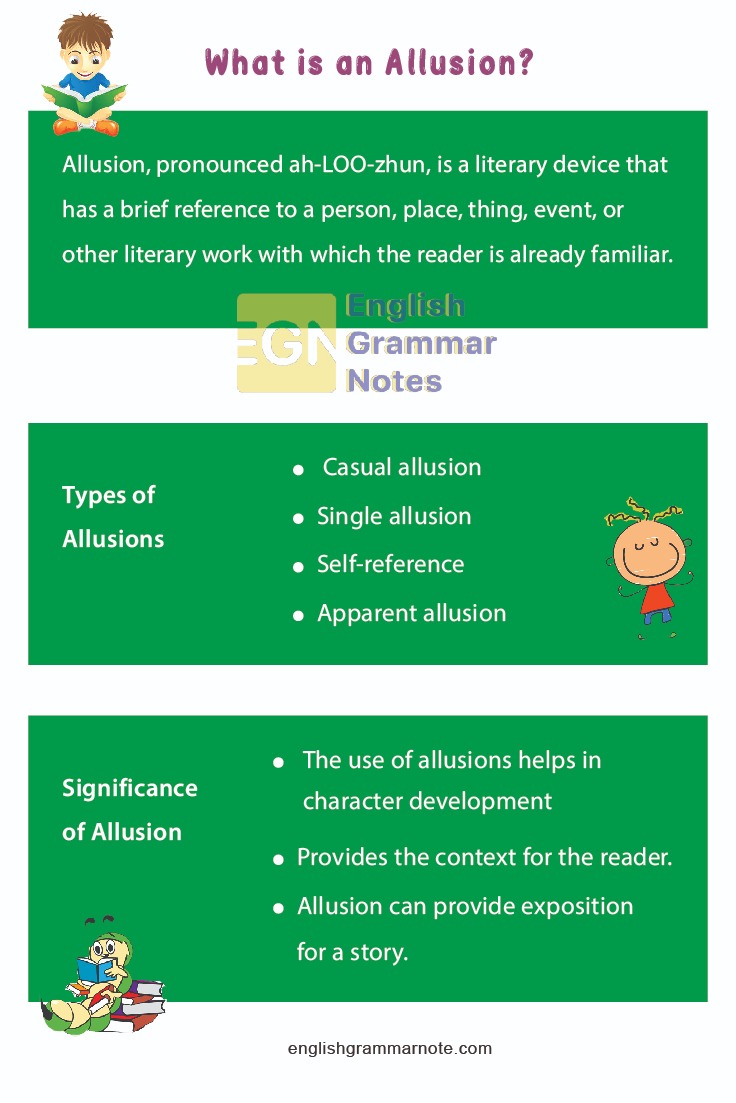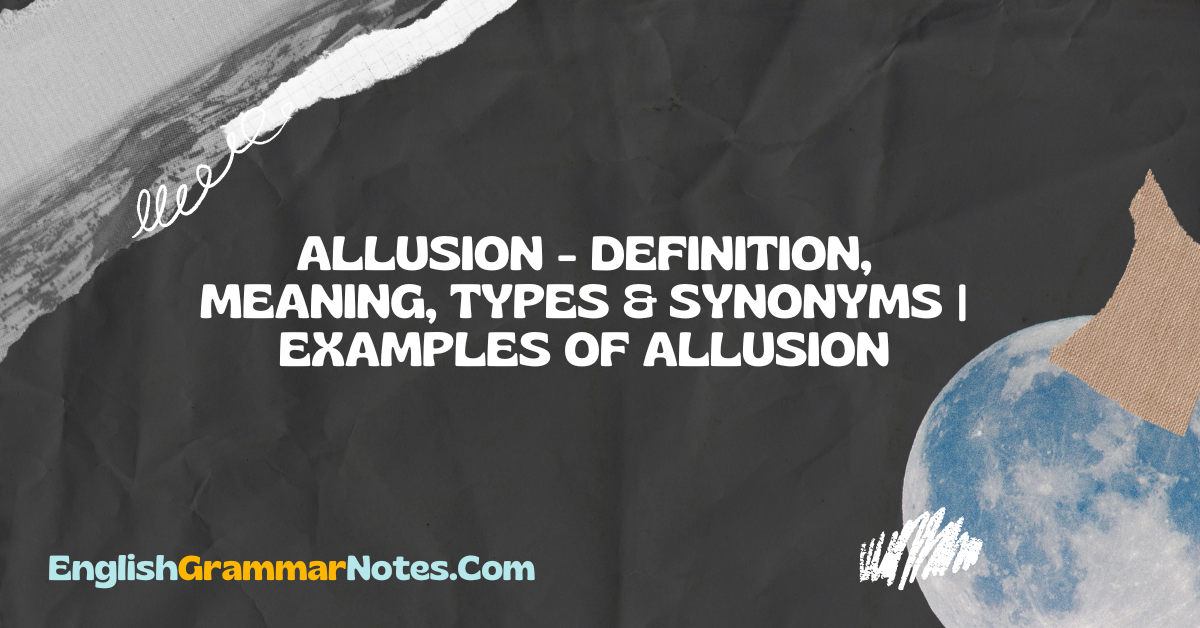An allusion is a common literary device that brings into mind an idea without specifically referring to it. You are sure to have come across allusions in a book, film, or in everyday life. Allusions are very helpful in emphasizing an idea or theme. In this article, you will be introduced to all the essential information about allusion including its definition, common examples, its significance, etc.
- What is an Allusion?
- Types of Allusions
- Allusion Examples
- Significance of Allusion
- How to use Allusion?
- Allusion Vs Analogy
- Allusion Synonyms
- What is an allusion?
- Distinguish between allusion and analogy?
- What are the benefits of using allusion?
What is an Allusion?
Allusion, pronounced ah-LOO-zhun, is a literary device that has a brief reference to a person, place, thing, event, or other literary work with which the reader is already familiar. As a literary device, allusion helps writers to compress a larger meaning to a single phrase or word.
Types of Allusions
Allusions are of different types. These include
- Casual allusion: Are used when a character feels something or sees something and recalls the event or the happening that matches it.
- Single allusion: the reference is made regarding one single event and readers and the audiences are intended to infer the same. It has a single meaning.
- Self-reference: When you refer to your own work in several other works, it is called self-allusion.
- Corrective allusion: These allusions correct or seem to correct the primary source to which the allusion makes reference.
- Apparent allusion: Such allusions are clear and specific. Writers do not use them without specific knowledge of the source, context, etc.
- Multiple allusions: The use of several allusions in a single text.
Allusion Examples
Given below are some of the common examples of allusions:
- She smiles like a Cheshire cat. (Alice in Wonderland)
- Is there an Einstein in your physics class? (Albert Einstein)
- Today might be the Ides of March. (Shakespeare’s Julius Caesar)
Famous Examples of Biblical Allusions
The Bible is used as a primary source for allusions. These include:
- cross (Christ, crucifixion)
- great patience (Job)
- garden (Eden, creation)
- Snake (serpent, Satan)
- flood (Noah’s Ark)
- apple/fruit (tree of knowledge, temptation)
- fraternal competition (Cain and Abel)
- garden (Eden, creation)
- Snake (serpent, Satan)
- flood (Noah’s Ark)
- apple/fruit (tree of knowledge, temptation)
Improve your English Grammar Skills and never make any mistakes in English concepts like parts of speech, tenses, English phrases, and a lot more by making the most of our English Grammar Notes.
Significance of Allusion
The use of allusion has several benefits. These include
- The use of allusions helps in character development
- Provides the context for the reader.
- Allusion can provide exposition for a story.
- Allusions also help in emphasizing certain ideas and themes.

How to use Allusion?
Given below are a few tips that would help you in the creation of allusions:
- Always be sure to use references familiar to the readers
- Always make a note of the allusions while preparing the outline of a text
- The allusion is used to show something, rather than tell. So make sure that the allusion serves the right purpose.
Allusion Vs Analogy
Allusions and analogy are entirely different terms. An analogy refers to a comparison between two ideas, objects, persons, or situations. Comparison is made on the basis of resemblances in the objects and things. On the other hand, an allusion is a literary device where there is just a reference to something, or some person, or some situation. It is not necessary that resemblance exists.
Read More:
Allusion Synonyms
Given below are some of the closest synonyms to allusion: inference, a clue, a cue, a hint, an inkling, a whiff, a sing, or even a signal. Other synonyms include a mention, suggestion, lead, or intimation.
FAQs on Allusion
Allusion, pronounced ah-LOO-zhun, is a literary device that has a brief reference to a person, place, thing, event, or other literary work with which the reader is already familiar.
2. Distinguish between allusion and analogy?
An analogy is a comparison between two ideas, objects, persons, or situations on the basis of resemblances in the objects and things. On the other hand, an allusion is a literary device where there is just a reference to something, or some person, or some situation. It is not necessary that resemblance exists
3. What are the benefits of using allusion?
The use of allusions helps in character development and provides the context in which events take place. Allusions are also helpful in emphasizing certain ideas and themes.
Conclusion
An allusion is a literary device that conveys a great deal of information in just very few short words. Allusions are only useful when they are recognized and understood by the reader. Allusions should be interpreted by the reader in the right manner. If an allusion is misunderstood, it can cause confusion in the readers.
